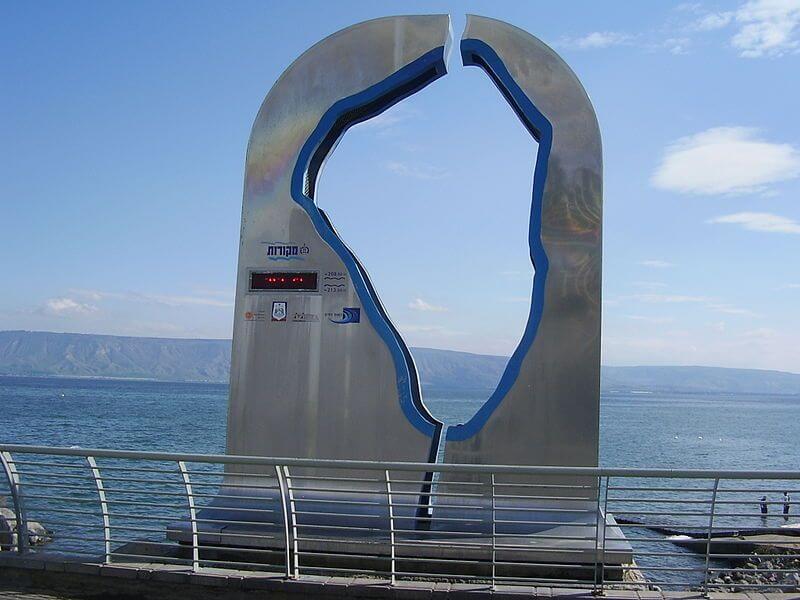This is what Dr. Amir Givati from the Water Authority said at the conference summarizing the work of the steering committee on the impact of climate change on the water system held at the University of Haifa as part of the National Knowledge Center for Climate Change Preparedness, which the university leads

"The Water Authority is preparing for a 10-15% reduction in Israel's natural water supply in the coming decades due to climate change," said Dr. Amir Givati from the Water Authority at the conference summarizing the work of the steering committee on the impact of climate change on the water sector held at the University of Haifa as part of the Knowledge Center The National for Climate Change Preparedness, which is led by the university.
Dr. Givati emphasized that the assessment in question is the result of climate change only and does not take into account reductions that result from other causes. He further added that this forecast has already been reflected in the master plan for the water sector, which will soon be submitted for government approval. According to him, all the different models compiled in recent years point to a similar picture: a decrease in the amount of water in the north compared to stability in the central region. He even noted that a decrease in the amount of water was measured in the Dan and Banias streams, "I deliberately emphasized these streams because these are streams that are not affected by the amount of human consumption, so this indicates that the main decrease is due to climatic changes and not because of an increase in water consumption", he noted.
Dr. Doron Markel, who is in charge of monitoring the Kinneret on behalf of the Water Authority, reinforced this claim with numbers from the Kinneret Basin, when he said that the increase in human use caused a loss of 60 million cubic meters (mcm), while the decrease in rainfall in recent years caused a loss of 90 mm. K.
Dr. Yossi Dreizin, a consultant to the Water Authority, stated that the cost of the master plan for the water sector that is being proposed these days, which should provide a solution for the water sector until the year 2050, will be approximately NIS 206 billion for the entire period (or approximately NIS 25 billion every five years).
Prof. Nurit Kliot from the University of Haifa, the chairman of the steering committee for the issue of the water sector, presented the main recommendations of the committee and began by saying that the viability of the most talked about strategy in recent years - water desalination - should be considered. "With the help of desalination, very large quantities of water can be supplied, but it has a high cost - both financially and environmentally," she said. Prof. Kliot mentioned a number of actions that the steering committee recommended based on their economic effectiveness, starting with increasing the field of education and information, through better treatment of waste water, prevention of water pollution, use of gray water and even collecting rainwater from roofs (which is recommended, according to the committee, especially in the south) . Water desalination, for those who are interested, is only in 19th place in terms of viability. "At any point in time you have to look at all the alternatives and choose the appropriate alternative. What is suitable for a period of drought does not necessarily have to be suitable for a more rainy period, and vice versa", Prof. Kliot concluded.
The steering committee on the issue of the water sector is one of 7 committees on various issues operating within the framework of the Climate Change Preparedness Center, which was established with the funding of the Ministry of Environmental Protection and the leadership of the University of Haifa. The aim of the center is to collect the knowledge that exists today in every field and propose a national policy.

2 תגובות
A few points that do not come up regarding the "solution" to desalination:
1. What is done with the salting (the salt that comes out in the process and is returned in a concentrated form to the sea)
2. How much energy (fuel) does it cost us to move water against the laws of nature (reverse osmosis)
3. Those who operate the desalination facilities are private corporations and not government companies. Do we really want our water to be in the hands of the capitalists?
4. Assuming that an immediate solution is needed, why did they wait so long and why are they now going into a system frenzy and building three desalination plants in addition to Ashkelon?
There are many more problematic points in solving the magic of desalination, but I recommend trying to look a little beyond the end of our noses, at least for the sake of our children.
Solutions? There are several and most of them are mentioned and require some work and some sacrifice from each of us - are we capable of this? Asimov says no, I'm a little more optimistic
Is anyone willing to remind us how much water Israel contributes to Jordan following the peace agreement with them?